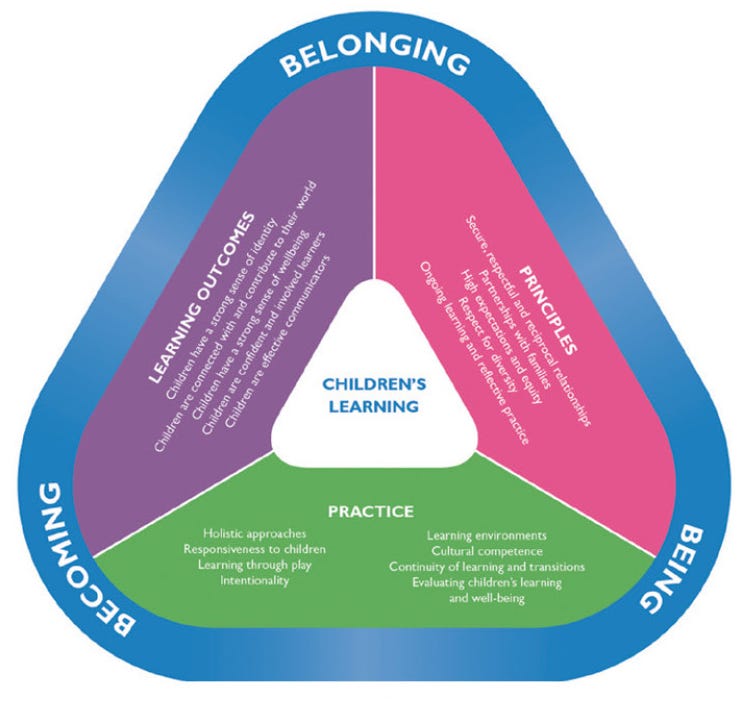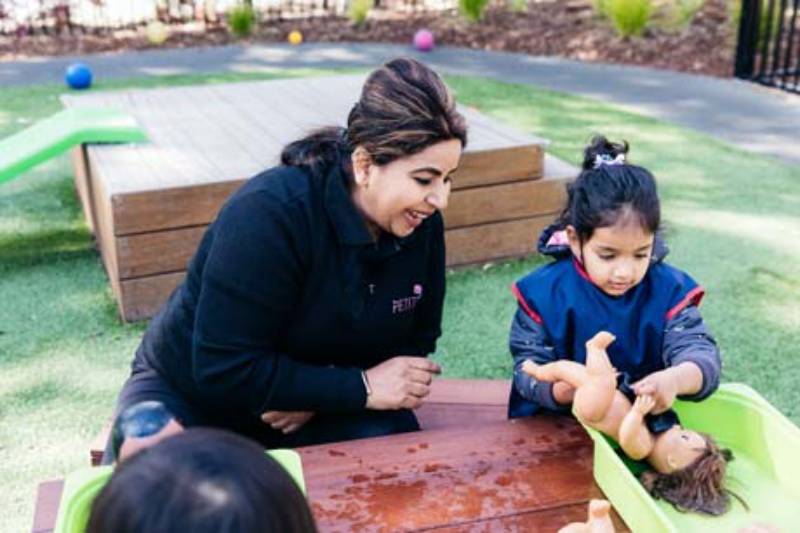The Early Years Learning Framework, or the EYLF, is a guide to help educators and caregivers support their children from birth to five-years-old. It has been developed by the Australian government to help educators enrich a child’s education throughout these early years.
During your time in early education and care services, it is highly likely that you will come across the Early Years Learning Framework (EYLF).
The educators will communicate, document your child’s learning observations, and refer to the EYLF. There is a reason for this – the EYLF is the basis for everything we do in Early Childhood education and care!
The EYLF was developed in 2009 as a result of the Council of Australian Governments (COAG) and is based on conclusive national and international evidence as to the importance of early childhood.
It aims to assist educators in providing young children with opportunities to maximise their learning and provide a foundation for future success. This ties in with the COAG vision that
“All children have the best start in life to create a better future for themselves and for the nation.”
“Childhood is a time to be, to seek and make meaning of the world” – EYLF
EYLF carries three main themes which you may see displayed in the Kids Club Early Childhood Learning centres:
- Belonging
- Being
- Becoming
At Kids Club Early Childhood Learning Centres, we believe in providing an environment where children, families and educators can develop a sense of belonging. Everyone is accepted and encouraged to be themselves and diversity is celebrated. At Kids Club Early Learning services, we provide opportunities for children to become successful lifelong learners.
The three EYLF themes are central to how build relationships and interact with children in our care, the natural, educational environment in which they play in, and how we plan for future learning experiences.
“Knowing where and with whom you belong is integral to human existence” – EYLF
The EYLF is made up of learning outcomes and principles and practices which educators use in their documentation of children’s learning and in their reflection and planning.
There are five EYLF learning outcomes and what this looks like at Kids Club Early Learning Services:
1. Children have a strong sense of identity
2. Children are connected with and contribute to their world
3. Children have a strong sense of wellbeing
4. Children are confident and involved learners
5. Children are effective communicators
The five learning outcomes are important lifelong goals for children, to provide your child with the best start for their future. Our educators implement these outcomes to plan for children’s learning and ensure they have covered all learning opportunities to further their development. These aims and outcomes are reflected in the half-yearly and end-of-year development summaries. We also capture teachable moments on our Kids Club app which families find very helpful and engaging.
Educators are not only guided by the 5 Learning Outcomes, but also by the Principles, Practices and Learning Environments of the EYLF, which include4:
Principles:
- Secure, respectful and reciprocal relationships
- Partnerships
- High expectations and equity
- Respect for diversity
- Ongoing learning and reflective practice
Practices:
- Holistic approaches
- Responsiveness to children
- Learning through play
- Intentional teaching
Learning Environments:
- Cultural competence
- Continuity of learning and transitions
- Assessment for learning
As you can see, the EYLF provides educators with a comprehensive framework under which to operate. Many terms from the learning outcomes, principles and practices may come up when speaking to educators or reading through documentation. The EYLF supports a model of curriculum planning as an ongoing cycle that implies working in partnership with families.
So, what does this mean for your child? As a team of educators, we are committed to implementing EYLF into our daily practices and using the principles to guide our decision-making. Your child, therefore, is being given opportunities to develop in each of the five learning outcomes and to promote a lifelong love of learning.
There is also a framework for school-aged children called My Time Our Place although that’s a discussion for another time!

What is the Early Years Learning Framework based on?
It has a strong emphasis on play-based learning as play is the best vehicle for young children’s learning providing the most stimulus for brain development. The Framework also recognises the importance of communication and language (including early literacy and numeracy) and social and emotional development.
What is the purpose of the Early Learning Framework?
It supports the rich early learning experiences of children, provides a focal point for dialogue among British Columbians, and creates a common language and greater understanding of the vital importance of early learning for all young children.
Who wrote the Early Years Learning Framework?
The Council of Australian Governments (COAG) developed the Framework to “assist educators to provide young children with opportunities to maximise their potential and develop a foundation for future success in learning”

